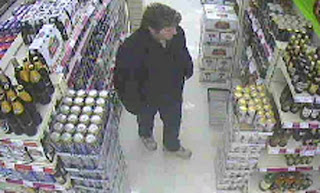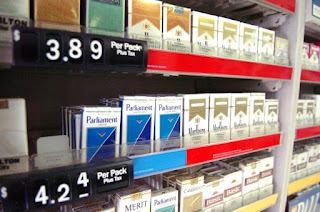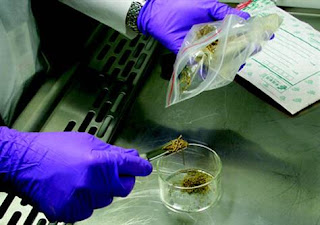'Tis the season of giving, and San Jose medical marijuana dispensary MedMar Healing Center is giving back to the community with a food drive to benefit Second Harvest Food Bank. From October 1st through January 20th, MedMar is joining together with other San Jose cannabis collectives to collect money and cans of food to help Second Harvest provide nutritious meals to local families in need.
"This holiday season, many families are having a hard time making ends meet. It is MedMar's hope that we can help make this holiday season amazing for every family, even in these hard economic times," says Douglas Chloupek, founder of MedMar.
Second Harvest Food Bank serves over 240,000 people each month-10% of the people in Santa Clara and San Mateo counties-and distributes over 45 million pounds of food per year, mainly to local seniors and families with dependant children. Since the recession hit in 2007, the number of people served by Second Harvest has skyrocketed 48%, but donations have flatlined over the last two years.
The holiday season, when Second Harvest gets the majority of its donations, will be critical to ensuring the food bank can help hungry members of the community get access to nutritious meals. The food bank's goal is to raise $11.3 million and collect 1.6 million pounds of food.
MedMar members who bring in nonperishable food items will get a $1 credit per can donated ($10 daily limit). The most-needed items are meals in a can (stew, chili, soup), tuna and canned meat, peanut butter, canned foods with pop-top lids, low-sugar cereals, 100% fruit juices in single-serving boxes, canned fruit packed in juice, and canned vegetables. MedMar is also accepting cash donations that will be passed along to Second Harvest.
вторник, 20 декабря 2011 г.
Cigarettes stolen from Smithfield shop

Someone broke into a smoke shop off Seven Bridges Road in Smithfield Township and made off with 21 cartons of cigarettes.
The shop, called Smokes R Us, was burglarized at 2:42 a.m. Saturday morning.
The thief or thieves, according to police entered the store by shattering a back window with a hammer. About $100 of cigarettes were stolen from the store.
The suspect was described as 5 foot 8 inches, of unknown gender, with a medium build and wearing gloves, a mask, a white-hooded sweatshirt, white hat and black pants.
Cigar Smokers Resist Possible FDA Rules

Cigar smokers are trying to raise their profile in Washington, D.C., in advance of what they expect will be new regulations from the U.S. Food and Drug Administration (FDA).
Cigar Rights of America, a group that represents smokers, filed registration papers on Thursday to lobby Congress on legislation that would eliminate any FDA authority over cigars.
It is the first time the group has registered to lobby. The group was founded in 2009, the same year that Congress, after decades of debate, granted the FDA the authority to regulate cigarettes and other items that the agency says fall within the law's definition of "tobacco products."
"The cigar consumers of America have basically never thought a lot of the things that have happened would happen to them," said Glynn Loope, the Cigar Rights of America's executive director.
Those challenges include proposed tax increases and state and local smoking bans. The FDA has not proposed any restrictions on cigars - excluding them from requirements such as new warning labels - but it said in July it is planning to include them in its definition of "tobacco products."
Health advocates say Congress should not roll back the authority of the FDA because it is in the best position to evaluate who is using a product and what the impact is.
"The reason Congress gave FDA authority is so that the decisions would be made based on facts and science, and not political muscle," said Matt Myers, president of the Campaign for Tobacco-Free Kids.
FDA spokeswoman Stephanie Yao declined to comment on when the agency would issue a formal, proposed definition, but industry advocates said they are planning as if they will see something in early 2012.
Central to the argument of the Cigar Rights of America is that traditional cigars are different from cigarettes or the inexpensive, flavored cigars sold in some U.S. shops.
"The very price point of cigars puts them out of the hands of youth," Loope said.
The smokers' group has backing from cigar manufacturers and retailers, which together make up most of its funding so far, Loope said. He declined to give the group's membership but said it has individual members in all 50 states.
понедельник, 12 декабря 2011 г.
Cigarettes go 'under the counter' at a Tesco store

The store is trialling the scheme to cover up its tobacco products. By law, all stores will have to do this by April next year.
The Government hopes this "under the counter" approach will further hit tobacco promotion and put more people off smoking.
The aim is to cut down the number of smokers in England from 20 per cent of adults to 18.5 per cent by 2015.
Tobacco products must be kept out of sight in large stores and supermarkets by April 2012. Smaller stores will have to make the change by April 2015.
Tesco are testing the new displays in a handful of their 2,865 stores across the UK, including the Market Harborough store, in The Square.
A Tesco spokesman said: "We are beginning to trial a new kiosk display in a small number of stores starting with Market Harborough to ensure it will comply with the law and, at the same time, work for both our staff and our customers."
Public health minister Anne Milton said: "We welcome this move by Tesco in Market Harborough.
"Tobacco displays will come to an end in supermarkets in April next year, and in all shops in 2015.
"This will help discourage young people from taking up smoking and help adult smokers who are trying to quit."
Shoppers praised the store's new initiative.
Dave Allen, of Nelson Street, Market Harborough, said: "I think it is an excellent idea.
"Cigarette manufacturers spend an awful lot of money making their products look sexy and appealing.
"If young kids have to ask specifically for cigarettes I don't think it will be quite so appealing."
The 53-year-old concert promoter said: "I think it is great the Market Harborough store is doing this.
"It's a step forward in the right direction."
Clara Taylor, 26, an engineering project assistant from Braybrooke, said: "It's a really good idea – it puts them out of people's minds.
"I don't smoke but I think people buy cigarettes because they are there – if they are not there it is slightly less tempting.
"If people are giving up smoking it will be good for them."
Nick Shaw, 32, who works at Harborough FM radio, said: "It was strange to see no cigarette products on display to start with. You would think they don't sell them anymore.
"I think it will put people off buying cigarettes. I am a smoker myself, but they won't be there for young people to look at."
Excise hike on cigarettes, motor tax to go up
Finance Minister Michael Noonan has said that to protect vulnerable people in society, he is proposing to provide a waiver of the household charge of €100 per dwelling for those on mortgage interest supplement and those in certain categories of unfinished housing estates. Provision will also be made to allow payment of the €100 in instalments.
The household charge is set to raise €160m a year and is an interim measure pending the design and implementation of a full property tax from 2014.
The Minister also said he is initiating a consultation period with the motor industry and other interested parties to start early next year to review options for the improvement in VRT and motor tax in future years.
But in the meantime, the Minister for Environment, Community and Local Government Phil Hogan will make a provision for an increase in motor tax from January 1. Mr Noonan said this will generate about €47m in 2012 to be used for Exchequer deficit reduction proposals.
Figures released with the Budget show that motor tax for cars in CO2 emission band A will rise from €104 to €160 while band B goes up from €156 to €225. These are the two biggest CO2 categories of cars for motor tax. More details were published by the Department of Finance.
He also said the Finance Department will engage in a consultation process with the car industry to put in place an export refund scheme which would allow for a refund of VRT on a vehicle on the permanent export of the vehicle to another member state in the European Union.
The Minister said that excise duty on a package of cigarettes will rise by 25 cent from midnight tonight. He said the 2% VAT increase will apply to alcohol but excise will not be increased.
He also said that the Minister of State at the Department of Health, Roisin Shorthall, will legislate to deal with the issues identified in a report on the causes and consequences of alcohol abuse in 2012, including the low cost of drink sold in off-licences and supermarkets.
Legislation to facilitate the extension of betting duty to remote betting will also be introduced as well as the introduction of betting intermediates duty to cover betting exchanges, the Minister said.
In an effort to combat absenteeism in the workplace, Minister Noonan said he is removing the existing tax exemption for the first 36 days of illness benefit and occupational injury benefit so that this incentive to absenteeism is removed.
He also said that Joan Burton, the Minister for Social Protection, will bring forward proposals to deal with absenteeism in both the public and private sectors next year.
Finance Minister Michael Noonan, in wrapping up his Budget speech, said the core mission of the Government is to get Ireland working again.
The household charge is set to raise €160m a year and is an interim measure pending the design and implementation of a full property tax from 2014.
The Minister also said he is initiating a consultation period with the motor industry and other interested parties to start early next year to review options for the improvement in VRT and motor tax in future years.
But in the meantime, the Minister for Environment, Community and Local Government Phil Hogan will make a provision for an increase in motor tax from January 1. Mr Noonan said this will generate about €47m in 2012 to be used for Exchequer deficit reduction proposals.
Figures released with the Budget show that motor tax for cars in CO2 emission band A will rise from €104 to €160 while band B goes up from €156 to €225. These are the two biggest CO2 categories of cars for motor tax. More details were published by the Department of Finance.
He also said the Finance Department will engage in a consultation process with the car industry to put in place an export refund scheme which would allow for a refund of VRT on a vehicle on the permanent export of the vehicle to another member state in the European Union.
The Minister said that excise duty on a package of cigarettes will rise by 25 cent from midnight tonight. He said the 2% VAT increase will apply to alcohol but excise will not be increased.
He also said that the Minister of State at the Department of Health, Roisin Shorthall, will legislate to deal with the issues identified in a report on the causes and consequences of alcohol abuse in 2012, including the low cost of drink sold in off-licences and supermarkets.
Legislation to facilitate the extension of betting duty to remote betting will also be introduced as well as the introduction of betting intermediates duty to cover betting exchanges, the Minister said.
In an effort to combat absenteeism in the workplace, Minister Noonan said he is removing the existing tax exemption for the first 36 days of illness benefit and occupational injury benefit so that this incentive to absenteeism is removed.
He also said that Joan Burton, the Minister for Social Protection, will bring forward proposals to deal with absenteeism in both the public and private sectors next year.
Finance Minister Michael Noonan, in wrapping up his Budget speech, said the core mission of the Government is to get Ireland working again.
New York smokers seek roll-your-own refuge

A new "roll-your-own" tobacco company in New York sells cigarettes for one-third of the normal price and claims its cigarettes are less harmful than those bought by the pack. Authorities say the stores are breaking the law and want them shut down.
New York is fast becoming a virtually smokeless city.
A citywide ban on smoking in public and heavy taxes at the cash register have discouraged smokers unwilling to pay between $11 and $15 (£7.00-£9.60) for a pack. Only 14% of New Yorkers now smoke, according to official statistics.
Loyal smokers, meanwhile, felt besieged, at least until May, when the first "roll-your-own" cigarette store opened.
Now, two Island Smokes stores in Manhattan and Staten Island sell loose tobacco and paper tubes to customers who use machines on site to roll their own cigarettes.
'Illegal' sales
Continue reading the main story
“
Start Quote
No one would claim that Ikea is not selling furniture just because the clients have to assemble that”
Eric Proshansky
New York City lawyer
The finished product looks virtually identical to a pre-packaged cigarette but costs only one-third of the price - $3.80 for a pack. That is in part because taxes on loose tobacco are far lower than on manufactured cigarettes.
Customers say the smokes taste better and are healthier than mass-market cigarettes, despite the discount.
"Here the tobacco is more like the tobacco I remember from the 70s, like real tobacco I smoked when I was younger," says Clarice Petillo, 51.
"The other cheap cigarettes you can find in the city are bootlegged, they are filled with nasty stuff."
Where smokers see a boon, city authorities see violations of numerous tobacco manufacturing, sales and tax regulations. They say the roll-your-own shops hinder the city's efforts to get people to quit smoking, and they have filed a federal lawsuit against Island Smokes in an effort to shut them down and collect the back taxes.
Expanded smoking bans unlikely before summer

A widening of the county’s ban on smoking in public places likely wouldn’t go into effect until next July, assuming officials can agree on how to word the necessary ordinance, County Manager Mike Ruffin says.
Ruffin’s assessment capped a review of the proposal by County Commissioners earlier this month.
The meeting saw commissioners agree with Durham’s City Council that the law needs to retain designated smoking-allowed areas outside otherwise smoke-free facilities like the downtown bus station.
Commissioners also voiced worry that plans to address smoking on sidewalks outside city or county property, hospitals or Durham Tech could go awry.
One who was dubious, Commissioner Ellen Reckhow, noted that the ordinance in theory would require a smoker to extinguish his or her cigarette while walking past City Hall, even though smoking on the sidewalk would be allowed in much of downtown.
“It’s going to be awkward,” Reckhow said.
Similarly, “if all the smokers in the courthouse decide they need a break and go one block away [to light up], we could wind up getting complaints from a business or a church,” she said. “All we’ve done is move the issue.”
Reckhow added that while she “really [doesn’t] appreciate smoking” because he own mother died of lung cancer, she also likes “logical ordinances” that are easy for the public to understand.
“I don’t like the way this is a patchwork, because it doesn’t seem like it’s going to work,” she said.
Assistant County Attorney Bryan Wardell said officials already were figuring on changing the wording of the ordinance to address a concern of the city’s, namely that the original draft might inadvertently exempt state-owned sidewalks.
The amended wording will cover all sidewalks “maintained by the city or county,” which in practice means all those near the targeted facilities because local governments, not the N.C. Department of Transportation, handles sidewalk maintenance, Wardell said.
Commissioner Pam Karriker cautioned that she doesn’t want to see the ordinance become a tool used to harass those who are mentally ill or homeless.
“I want to make sure we don’t further stigmatize that population,” she said, arguing for the preservation of smoking-allowed areas outside facilities that serve them.
Commissioners Chairman Michael Page agreed, but acknowledged the possibility of sending “dual messages” because of the known harms of smoking.
County Health Director Gayle Harris said her department wants to widen existing no-smoking bans because there is “no safe level of exposure” to tobacco smoke.
Tobacco costs the U.S. about $200 billion in medical expenses and lost productivity each year, she said, adding that about 440,000 people die annually from tobacco-related conditions.
Read more: The Herald-Sun - Expanded smoking bans unlikely before summer
HPD Issues First Smoking Law Citations In Years

For the first time in more than four years, a Honolulu police officer has issued tickets to bar patrons for breaking the statewide smoking ban.
The owner and employees of Kelley O'Neil's Irish pub and grill on Lewers Street in Waikiki said a police officer ticketed three of its customers for smoking in the bar on a Sunday in October, in response to another customer who called 911 to report them.
The statewide law that's been in effect since November of 2006 prohibits people from smoking in restaurants, bars and other workplaces.
Kelly O'Neil's and a few other bars follow the letter of the law by posting no smoking signs, but still allow their customers to smoke, in violation of the law.
These are the first citations police have issued since a police officer ticketed someone for smoking at a Chinatown bar nearly five years ago, right after the law took effect.
"From what I understand, they didn't know how to issue them, they don't know how to go to court with them and I believe each, the gentleman who was cited has had his case extended more than once, for their purposes, to try to figure out from their end what they're doing," said Bill Comerford, owner of Kelley O'Neil's and three other bars is head of the Hawaii Bar Owners' Association.
He said one of the customers ticketed is from Hawaii and the other two were visiting from Guam.
Comerford said his three customers were issued summons requiring them to go to court, when they should have just been able to pay a fine, sort of like a parking or speeding ticket.
"We're asking our tourists now if they are cited here, if they didn't show up for it, there would be a bench warrant. Would they come back again? I don't think so. There are problems in this law," Comerford said.
Comerford declined to identify the bar customers who were cited, but said the Hawaii man went to court and was ordered to pay a $100 fine.
It's unclear what the outcome is of the cases of the men from Guam.
Comerford said state health department officials have told him bar owners could also be ticketed under the law, but none of them have been cited yet, as far as he knows.
"Do you know anybody in the world who's gonna call the police on themselves, for somebody else's actions? It's ludicrous. But that's what the law is. That's what the rules are," Comerford said.
The state health department said it's still working out an enforcement agreement with the police department, five years after the smoking ban took effect, and more than one year after the rules for the ban were signed by former Gov. Linda Lingle.
"We feel that we can get the strongest possible enforcement through working with the local police and law enforcement issues," said Julian Lipsher, the program manager of tobacco prevention and education for the state Department of Health. "It was really meant to be a self-enforcing, self-policing kind of law."
After the ban took effect five years ago, the Health Department had to develop rules and regulations for the new law, working with lawyers at the state attorney general's office to do so. State health officials said rule making usually takes two years, but this process took nearly four years.
The health department held public hearings across the state and appeared three times before the state's Small Business Regulatory Review Board, which Lipsher said didn't like the new regulations.
Lipsher said health officials had to repeatedly meet with the board, "To provide clarification of what the law was about, and to provide explanation and development of rules and how they would affect small business."
Lingle, a Republican, signed the rules last August and they finally took effect Sept. 6, 2010, nearly four years after the smoking restrictions became law. Lingle was lobbied heavily by business leaders not to sign the law, according to opponents of the restrictions.
Violators of Ohio smoking ban owe state $1.8M

Five years after Ohio enacted a ban on indoor smoking, businesses still owe the state almost $2 million in fines for violating the law.
The Springfield News-Sun reported businesses statewide have been fined more than $2.74 million since enforcement of the ban began. Ohio Department of health numbers show businesses still owe more than $1.82 million as of Dec. 5.
The ban is being challenged before the Ohio Supreme Court by a Columbus bar that says it's unconstitutional.
Health department official Mandy Burkett said a number of businesses just aren't paying their fines.
Burkett said the health department and the Ohio Attorney General's office are trying to improve compliance. The department is turning over some of the unpaid fines to the attorney general's office for collection.
Medical marijuana shows promise for pain

After all the usual and proper medical approaches did nothing for her pain, Cheryl Campbell, a nurse and mother, says she finally built up the courage to ask her doctor, "How do you feel about prescribing me marijuana?"
The 30-year-old Ottawa woman suffers from fibromyalgia and chronic fatigue syndrome. Her pain is body-wide - a constant, sometimes stabbing ache in her back, hips, knees, shoulders and virtually every joint. Doctors once put her on morphine. It cut the pain, but she couldn't function. She says her mind felt so heavy with fog she couldn't carry on a conversation.
She's been using marijuana for pain for two years; she has a federal licence to possess it. She says it helps her sleep at night. In the morning, it helps ease the stiffness in her hips and back enough that she can make it into the shower.
Campbell says she owes her ability to get through each day to a drug that critics condemn, especially when it's smoked - which is how most of the thou-sands of Canadians who self-medicate with pot prefer to take it. The U.S. Drug Enforcement Agency was unequivocal earlier this year: Smoked marijuana is not medicine, and it's not safe.
"No matter what medical condition has been studied," the agency ruled, "other drugs already approved by the [U.S. Food and Drug Administration] have been proven to be safer than smoked marijuana."
But research into medicinal marijuana is undergoing a surge of interest, with more evidence emerging not only of its ability to ease human suffering, but also of its apparent safety.
Some say cannabis may be less toxic to humans than over-the-counter pain relievers.
Four small but scientifically controlled experiments in recent years have concluded that smoked cannabis can provide moderate relief from chronic, severe non-cancer pain - including HIV-related nerve pain and post-traumatic neuropathy, a dreaded condition that can follow an injury or medical procedure. Both are notoriously resistant to conventional treatments.
Подписаться на:
Сообщения (Atom)
